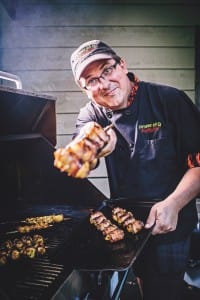The Newsroom
Grilling Tools of the Trade
BBQ Brian Misko, author of Grilling with House of Q offers his advice on grilling equipment. The most common cooking device in many backyards is a gas grill; here are Brian’s top three features to consider when looking for one:
1. The case: In the past 5 to 10 years, shiny, low-cost, stainless steel gas grills have become very popular. Although they often heat up nicely, once the lid is opened and the heat escapes, these inexpensive grills struggle to return to their original cooking temperature. For energy efficiency and best results, make sure the actual cooking chamber of the grill—the case—is made from a high-quality steel or another solid material that will retain heat. Inexpensive grills have the cheapest price tag for a reason: they are made with cheap materials and they struggle to perform.
2. The grill grates: Depending on the manufacturer or even the retailer, you may be presented with options for different types of grill grates for your new grill. These include cast iron (which can also be coated with enamel or porcelain) and stainless steel. Cast-iron grates (uncoated) are perfect for searing; however, if you do not clean and oil them properly, your meats will stick. Enamel- or porcelain-coated cast-iron grates prevent meats from sticking and they are low maintenance, but all that expansion and contraction from the heat can, in time, break down the coating. Stainless steel grates are excellent for all-around use, and though they need a good coat of oil from time to time, they can generally be brushed clean and work very well. I like stainless steel grates for my gas grill.
3. The burners: Many companies advertise how hot their grills are by referencing British Thermal Units, or BTUs. One BTU is the energy it takes to increase one pound of water by one degree Fahrenheit, but this measurement can be easily misinterpreted. As far as I’m concerned, a grill rated for 80,000 BTUs just means it will consume more fuel and energy than a comparable 45,000 BTU one; it does not mean it is a better grill. What’s more important is the number of burners. More than two burners means more flexibility for hot and cool zones as you cook, so ignore the BTU rating.
Dedicated smokers (as opposed to using your gas grill as a smoker) are becoming increasingly popular, and there are several different technologies to contemplate. The most common options are gas (propane), charcoal, wood and pellet smokers. Each of these has benefits and drawbacks. I prefer a charcoal smoker for flavour; however, I also like the convenience of a pellet smoker. I encourage you to see what is available in your local stores and learn what might be best for your backyard.
